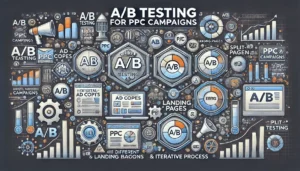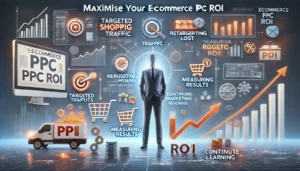Struggling with Ecommerce PPC ROI? Unleash Explosive Growth with These Expert Tactics

Struggling with Ecommerce PPC ROI? In today’s competitive online shopping world, getting people to visit your store and buy things is really important. Pay-Per-Click (PPC) advertising can help a lot, but it can be tricky to get a good return on investment (ROI). This article will show you some expert tips to make your PPC campaigns work better and help your business grow.
Key Takeaways
- Understand the basics of Ecommerce PPC to make better decisions.
- Choose the right keywords and write ads that make people want to click.
- Use advanced targeting to reach the right audience and save money.
- Set up retargeting campaigns to win back visitors who didn’t buy the first time.
- Keep an eye on your budget and use data to keep improving your ads.
Understanding the Ecommerce PPC Landscape
The Importance of PPC in Ecommerce
In today’s competitive ecommerce world, attracting high-quality traffic and converting visitors into paying customers is crucial. This is where Pay-Per-Click (PPC) advertising shines, especially in the realm of eCommerce PPC. By leveraging PPC, you can drive highly targeted traffic to your online store, increasing the chances of conversions. You only pay for ads when someone clicks on them, making it a cost-effective way to reach potential customers.
Common Challenges in PPC Campaigns
Running PPC campaigns isn’t without its hurdles. Many businesses struggle with keyword selection, budget management, and ad copy that fails to convert. Additionally, without a proper Google ads audit, it’s easy to miss out on optimisation opportunities. Partnering with a PPC eCommerce agency can help you navigate these challenges effectively.
Key Metrics to Monitor
To ensure your PPC campaigns are successful, it’s essential to keep an eye on key metrics. These include:
- Click-Through Rate (CTR)
- Conversion Rate
- Cost Per Click (CPC)
- Return on Ad Spend (ROAS)
Monitoring these metrics will help you understand what’s working and what needs adjustment. Regular analysis can lead to continuous improvement and better ecommerce PPC ROI for your efforts.
Understanding the PPC landscape is the first step towards creating campaigns that drive results. With the right strategies and tools, you can turn clicks into customers and boost your online sales.
Crafting High-Impact PPC Campaigns
Keyword Research and Selection
Choosing the right keywords is the foundation of any successful PPC campaign. Start by identifying terms that your target audience is likely to use when searching for products or services like yours. Use tools like Google Keyword Planner to find high-volume, low-competition keywords. Remember, the more specific your keywords, the better your chances of reaching the right audience.
Ad Copy that Converts
Your ad copy needs to be compelling and relevant to your audience. Focus on creating headlines that grab attention and descriptions that clearly convey the benefits of your product or service. Use action-oriented language and include a strong call-to-action (CTA). Testing different versions of your ad copy can help you determine what resonates best with your audience.
Optimising Landing Pages
A well-optimised landing page is crucial for converting clicks into customers. Ensure that your landing page is relevant to the ad and provides a seamless user experience. This includes fast load times, mobile-friendliness, and clear, concise content. Use A/B testing to find the most effective layout and design elements. A strong landing page can significantly improve your conversion rates and overall ecommerce PPC ROI.
Crafting high-impact PPC campaigns requires a blend of strategic keyword selection, compelling ad copy, and optimised landing pages. By focusing on these elements, you can create campaigns that not only attract clicks but also convert them into loyal customers.
Advanced Targeting Techniques for Better Ecommerce PPC ROI
Audience Segmentation
To get the most out of your PPC campaigns, you need to segment your audience effectively. By breaking down your audience into smaller groups based on their behaviour, interests, or demographics, you can tailor your ads to meet their specific needs. This approach not only increases engagement but also drives more qualified traffic to your site. Reach targeted audiences who are actively searching for your products, leading to higher conversions.
Geotargeting Strategies
Geotargeting allows you to focus your ads on users in specific locations. This is especially useful for businesses that operate in certain regions or have physical stores. By targeting users in these areas, you can drive more foot traffic and local sales. Use geotargeting to show ads to people in areas where your products are most popular, maximising your return on ad spend (ROAS).
Utilising Lookalike Audiences
Lookalike audiences are a powerful tool for expanding your reach. By creating a lookalike audience, you can target users who share similar characteristics with your existing customers. This helps you attract new customers who are likely to be interested in your products. Drive qualified traffic that is already interested in making a purchase, thereby increasing your chances of conversion.
By leveraging these advanced targeting techniques, you can significantly improve your ecommerce PPC ROI and drive more sales for your ecommerce business.
Leveraging Retargeting to Capture Lost Opportunities
Setting Up Retargeting Campaigns
Retargeting is a powerful tool in e-commerce marketing. It helps you reconnect with potential customers who have visited your site but left without making a purchase. To set up a retargeting campaign, start by building audience lists. These lists are groups of users who have interacted with your site in some way. For example, you can create lists based on users who viewed specific products or added items to their cart but didn’t check out.
Personalising Retargeting Ads
Personalising your retargeting ads can significantly increase their effectiveness. Tailor your ads to reflect the interests and behaviours of your audience. For instance, if a user viewed a particular product, show them an ad featuring that product with a special offer. Personalised ads can make users feel valued and more likely to return to your site.
Measuring Retargeting Success
To measure the success of your retargeting campaigns, monitor key metrics such as click-through rates (CTR), conversion rates, and return on ad spend (ROAS). These metrics will help you understand how well your campaigns are performing and where you might need to make adjustments. Regularly reviewing these metrics ensures that your retargeting efforts are driving the desired results.
Retargeting can turn casual browsers into loyal customers by keeping your brand top of mind and encouraging them to complete their purchase.
Maximising Budget Efficiency
Bid Management Strategies
To get the most out of your PPC budget, start by setting SMART goals: Specific, Measurable, Achievable, Relevant, and Time-bound. These goals help you track your campaign’s success. Regularly monitor your ad performance and adjust bids and budgets based on what’s working. Using bid management tools can optimise your bids for the best possible return on investment (ROI).
Allocating Budget Across Channels
When it comes to PPC, managing your marketing budget is essential. Start with a small budget and gradually increase it as you see positive results. Tools like Google Ads allow you to set daily budgets and bid amounts, giving you control over your spending.
Using Automation Tools
Automation tools can save you time and money by optimising your campaigns in real-time. These tools can adjust bids, allocate budget, and even pause underperforming ads automatically. This ensures that your budget is always being used efficiently.
Efficient budget management is key to maximising your ecommerce PPC ROI. By using the right tools and strategies, you can ensure that every dollar spent is driving the best possible results.
Building a Data-Driven PPC Strategy
Analysing Campaign Performance
To truly excel in PPC management, you need to dive deep into your campaign data. Regularly conducting a thorough PPC audit helps you identify what’s working and what needs improvement. Look at key metrics like click-through rates (CTR), conversion rates, and cost per acquisition (CPA). These numbers will guide your decisions and help you optimise your campaigns for better results.
A/B Testing for Continuous Improvement
A/B testing is a powerful tool for refining your PPC campaigns. By testing different ad copies, landing pages, and even call-to-action buttons, you can determine what resonates best with your audience. Start with small changes and gradually test more significant elements. This iterative process ensures that your campaigns are always improving and adapting to market trends.
Leveraging Analytics Tools
Utilise advanced analytics tools to gain deeper insights into your PPC performance. Google Analytics, for example, can provide detailed reports on user behaviour, helping you understand how visitors interact with your site after clicking on your ads. These insights are invaluable for making data-driven decisions and fine-tuning your strategy.
A data-driven approach to PPC not only boosts your ecommerce PPC ROI but also provides a clear roadmap for future campaigns. By continuously analysing and testing, you can stay ahead of the competition and achieve sustained growth.
Enhancing Brand Presence Through PPC
Creating Brand-Focused Ads
Creating brand-focused ads is essential for standing out in a crowded market. Your ads should reflect your brand’s unique voice and values. This not only helps in building recognition but also fosters trust among potential customers. Collaborate with a PPC ad agency to craft compelling ad copy that resonates with your audience.
Integrating PPC with Social Media
Integrating PPC with social media can amplify your brand’s reach. Platforms like Facebook and Instagram offer robust targeting options that can complement your Google ads PPC efforts. By aligning your PPC campaigns with your social media strategy, you can create a cohesive brand experience across multiple channels.
Measuring Brand Lift
Measuring brand lift is crucial to understand the impact of your PPC campaigns on brand awareness. Utilise tools provided by Google ads agencies to track metrics like ad recall and brand recognition. This data will help you refine your strategy and allocate your budget more effectively.
Partnering with a London PPC agency can provide you with the expertise needed to enhance your brand presence through PPC. Their knowledge of the local market can be invaluable in crafting targeted campaigns that resonate with your audience.
Conclusion
Navigating the world of eCommerce PPC ROI can be challenging, but with the right strategies, you can turn your campaigns into powerful tools for growth. By focusing on targeted traffic, retargeting lost opportunities, and continuously measuring your results, you can maximise your ecommerce PPC ROI and drive significant sales. Remember, the key to success lies in staying adaptable and always learning from your campaigns. Implement these expert tactics, and watch your eCommerce business thrive like never before.
Frequently Asked Questions
What is PPC in ecommerce?
PPC, or pay-per-click, is a type of online advertising where you pay a fee each time someone clicks on your ad. It’s used in ecommerce to drive traffic to your online store.
Why is PPC important for ecommerce?
PPC is important because it helps attract targeted traffic to your site, which can lead to more sales and higher revenue. It also allows you to measure the effectiveness of your ads in real-time.
What are common challenges in PPC campaigns?
Some common challenges include high ad costs, low conversion rates, and difficulty in selecting the right keywords. Managing and optimising these aspects can be tricky but is crucial for success.
How can I improve my PPC ad copy?
To improve your ad copy, make sure it is clear, concise, and compelling. Highlight the benefits of your product and include a strong call-to-action to encourage clicks.
What is retargeting in PPC?
Retargeting is a strategy where you show ads to people who have previously visited your site but didn’t make a purchase. This helps to remind them of your products and encourages them to return and buy.
How do I measure the success of my PPC campaigns?
You can measure success by tracking key metrics like click-through rate (CTR), conversion rate, and return on ad spend (ROAS). These metrics help you understand how well your ads are performing and where you can improve.
Author
Search Blog
Free PPC Audit
Subscribe to our Newsletter
The Voices of Our Success: Your Words, Our Pride
Don't just take our word for it. With over 100+ five-star reviews, we let our work-and our satisfied clients-speak for us.
"We have been working with PPC Geeks for around 6 months and have found Mark and the team to be very impressive. Having worked with a few companies in this and similar sectors, I rate PPC Geeks as the strongest I have come across. They have taken time to understand our business, our market and competitors and supported us to devise a strategy to generate business. I value the expertise Mark and his team provide and trust them to make the best recommendations for the long-term."
~ Just Go, Alasdair Anderson



